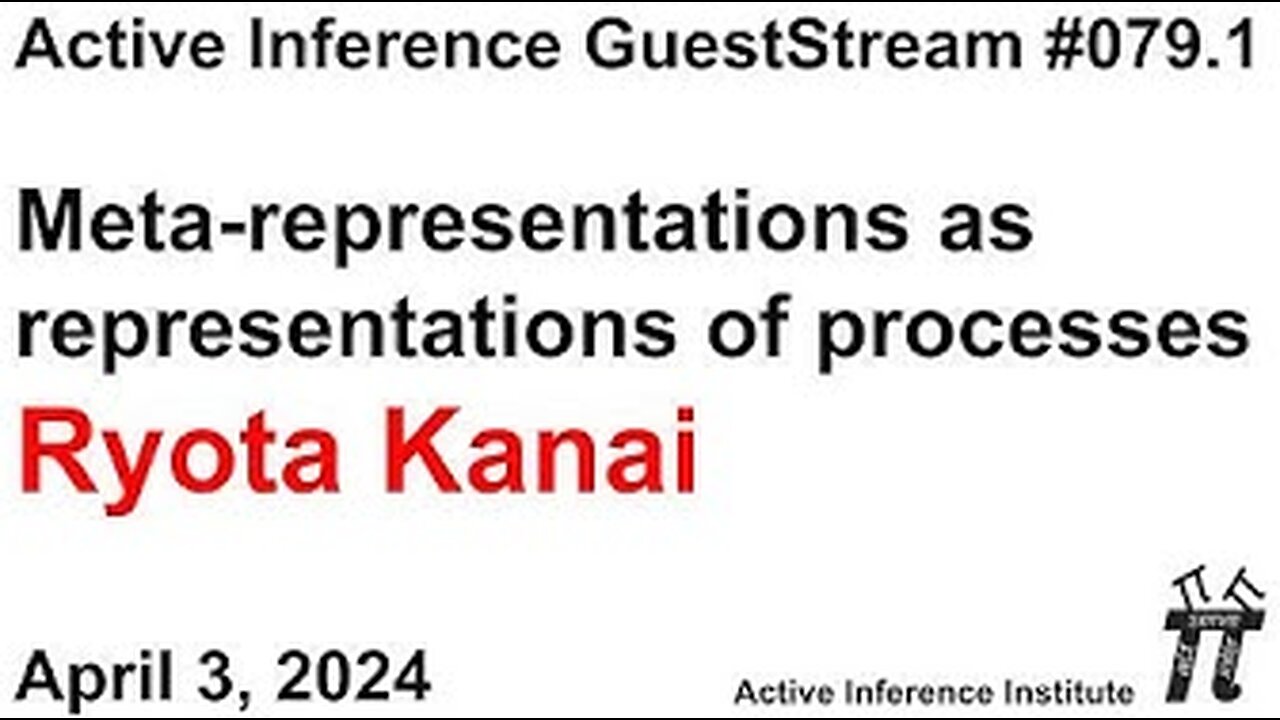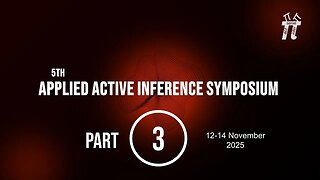Premium Only Content

ActInf GuestStream 079.1 ~ Ryota Kanai: "Meta-Representations as Representations of Processes"
"Meta-Representations as Representations of Processes"
Ryota Kanai, Ryota Takatsuki, and Ippei Fujisawa
https://osf.io/preprints/psyarxiv/zg27u
In this study, we explore how the notion of meta-representations in Higher-Order Theories (HOT) of consciousness can be implemented in computational models. HOT suggests that consciousness emerges from meta-representations, which are representations of first-order sensory representations. However, translating this abstract concept into a concrete computational model, such as those used in artificial intelligence, presents a theoretical challenge. For example, a simplistic interpretation of meta-representation as a representation of representation makes the notion rather trivial and ubiquitous. Here, we propose a refined interpretation of meta-representations. Contrary to the simplistic view of meta-representations as mere transformations of the first-order representational states or confidence estimates, we argue that meta-representations are representations of the processes that generate first-order representations. This presents a process-oriented view whereby meta-representations capture the qualitative aspect of how sensory information is transformed into first-order representations. To concretely illustrate and operationalize thus formulated notion of meta-representation, we constructed "meta-networks" designed to explicitly model meta-representations within deep learning architectures. Specifically, we constructed meta-networks by implementing autoencoders of first-order neural networks. In this architecture, the latent spaces embedding those first-order networks correspond to the meta-representations of first-order networks. By applying meta-networks to embed neural networks trained to encode visual and auditory datasets, we show that the meta-representations of first-order networks successfully capture the qualitative aspects of those networks by separating the visual and auditory networks in the meta-representation space. We argue that such meta-representations would be useful for quantitatively compare and contrast the qualitative differences of computational processes. While whether such meta-representational systems exist in the human brain remains an open question, this formulation of meta-representation offers a new empirically testable hypothesis that there are brain regions that represent the processes of transforming a representation in one brain region to a representation in another brain region. Furthermore, this form of meta-representations might underlie our ability to describe the qualitative aspect of sensory experience or qualia.
Active Inference Institute information:
Website: https://activeinference.org/
Twitter: https://twitter.com/InferenceActive
Discord: https://discord.gg/8VNKNp4jtx
YouTube: https://www.youtube.com/c/ActiveInference/
Active Inference Livestreams: https://coda.io/@active-inference-institute/livestreams
CSID: ebb7a10035fed94d
Content Managed by ContentSafe.co
-
 2:16:55
2:16:55
Active Inference Institute
10 days ago5th Applied Active Inference Symposium (Part 3, Nov 14, 2025) ~ LIVE
101 -
 1:06:17
1:06:17
Graham Allen
5 hours agoFAKE NEWS Is Everywhere!! Are We Living In The Upside Down?!
138K452 -
 2:59:36
2:59:36
Wendy Bell Radio
8 hours agoFeeding Their Greed
67.1K79 -
 1:55:12
1:55:12
Badlands Media
10 hours agoBadlands Daily: November 26, 2025
51.8K10 -
 1:13:11
1:13:11
Chad Prather
19 hours agoGratitude That Grows in Hard Ground: A Thanksgiving Message for the Soul
79.3K44 -
 LIVE
LIVE
LFA TV
15 hours agoLIVE & BREAKING NEWS! | WEDNESDAY 11/26/25
2,745 watching -
 1:59:03
1:59:03
The Chris Salcedo Show
16 hours ago $12.62 earnedRemembering Rush On A Truly American Holiday
39.1K3 -
 36:24
36:24
Julie Green Ministries
6 hours agoLIVE WITH JULIE
117K233 -
 1:05:27
1:05:27
Crypto Power Hour
14 hours ago $10.31 earnedWhat You Need To Know About Gold Tokenization
71.6K8 -
 1:46:14
1:46:14
LIVE WITH CHRIS'WORLD
15 hours agoTHE WAKE UP CALL - 11/26/2025 - Episode 14
33.9K2